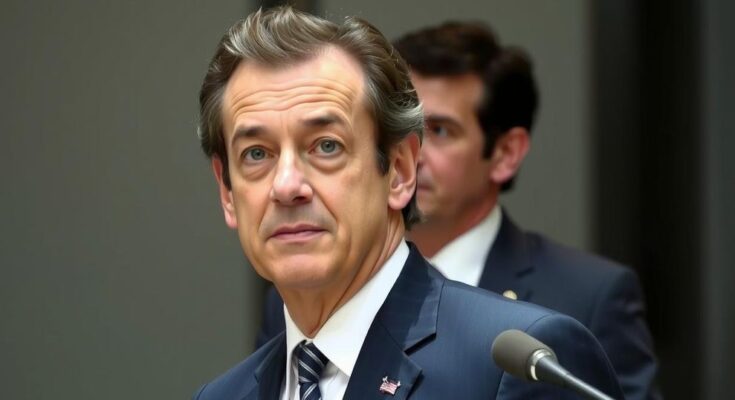Nicolas Sarkozy is currently on trial in Paris, accused of receiving illicit funds from Libyan leader Muammar Gaddafi to finance his 2007 presidential campaign. The prosecution alleges that Sarkozy promised to assist Gaddafi in improving his international image in exchange for the funds. Sarkozy denies the charges, attributing them to political motivations against him. If convicted, he faces up to ten years in prison.
Nicolas Sarkozy, the former President of France, has commenced his trial in Paris regarding allegations of receiving illicit financial support from the late Libyan leader Muammar Gaddafi for his successful 2007 presidential campaign. The prosecution argues that in return for the funds, Sarkozy promised to assist Gaddafi in improving his international standing. The charges against Sarkozy were first brought to light after allegations made by Saif al-Islam, Gaddafi’s son, in 2011, coupled with statements from businessman Ziad Takieddine, who claimed to possess written evidence of Sarkozy’s campaign being significantly funded by Libya. Alongside Sarkozy, twelve others face trial concerning this alleged conspiracy.
Sarkozy has consistently refuted the allegations, attributing them to individuals with ulterior motives aiming to undermine him. He served as France’s president from 2007 to 2012, and since his loss in the presidential race in 2012, he has faced multiple criminal probes. In 2021, Sarkozy notably became the first former French president sentenced to prison for attempting to bribe a judge. While he has been granted the possibility of serving his sentence at home with an electronic tag, the details of that arrangement remain pending as he appears in court without the tag set for this hearing.
The investigation drew attention in 2013, sparked by a claim from Saif al-Islam, and further expanded when Takieddine stated that campaign financing by Tripoli continued even after Sarkozy assumed the presidency. Additionally, Carla Bruni-Sarkozy, the former president’s wife, has faced charges related to the concealment of evidence pertinent to this case, both of which she denies. The ongoing trial, which may last until 10 April, carries significant implications for Sarkozy, who could face up to ten years in prison if convicted.
The trial of Nicolas Sarkozy is significant as it marks a crucial development in the ongoing legal challenges faced by former political leaders regarding corruption and illicit financing in political campaigns. Sarkozy’s presidency was characterized by various controversies, which have now resurfaced as allegations of financial misconduct come to the forefront of legal proceedings. The involvement of foreign leaders, such as Gaddafi, further complicates the situation, exposing the potential entanglement of international relations with domestic political integrity. The case could set precedents for accountability at the highest levels of government and influence perceptions of political ethics in France.
In summary, Nicolas Sarkozy’s trial represents a pivotal moment in France’s political landscape, spotlighting issues of corruption, campaign financing, and accountability. Facing serious allegations tied to his previous presidential election, Sarkozy’s case not only has the potential to affect his personal legacy but also underscores broader concerns regarding the integrity of political officeholders. As the trial progresses, the outcomes could significantly impact public trust in political institutions within France.
Original Source: www.bbc.com




